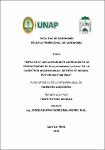Impacto de las capacidades agrícolas en la productividad de Musa paradisiaca “plátano” en la carretera Mazan-Indiana, distrito de Indiana, provincia de Maynas
Abstract
Banana, Musa paradisiaca, has been produced in the area of the Mazán-Indiana
highway, a district of Indiana, for decades; however, its level of agricultural
production was not always significant, despite the time that producers dedicate to
the cultivation of this species. Therefore, the present research study aims to analyze
and publicize the relationship that exists between agricultural productivity and the
link with human capital as productive capacities themselves. For which field visits
have been carried out and a survey has been applied to 22 banana producers and
to process the data obtained in the statistical package SSPS 21.0, for its respective
analysis and study, until arriving at the conclusions of each one of the variables.
proposals in this work.
Among the most outstanding, it can be pointed out that the type of training, the level
of schooling, the level of social organization and the number of hectares per farmer
are related to the productivity of the banana crop in a negative sense, since the
production and productivity achieved is low.
Finally, within the theory of human capital, the development of productive capacities
is presented as an additive and accumulative resource, being an element that takes
possession behind local and regional economic growth, and that with adequate
planning could be promoted in order to improve the production and productivity of
the crop, in order to improve the quality of life of these inhabitants. En la zona de la carretera Mazán-Indiana, distrito de Indiana desde hace décadas se
produce plátano, Musa paradisiaca, sin embargo, su nivel de producción agrícola no
siempre fue significativo, a pesar del tiempo que dedican los productores al cultivo
de esta especie. Por lo que, el presente estudio de investigación tiene como objetivo
analizar y dar a conocer la relación que existe entre la productividad agrícola y la
vinculación con el capital humano como capacidades productivas propiamente. Para
lo cual se ha realizado visitas de campo y se ha aplicado una encuesta a 22
productores de plátano y procesar la data obtenida en el paquete estadístico SSPS
21.0, para su análisis y estudio respectivo, hasta arribar a las conclusiones de cada
una de las variables propuestas en el presente trabajo.
Dentro de lo más resaltante se puede señalar que, el tipo de capacitaciones, el nivel
de escolaridad, el nivel de organización social y la cantidad de has., por agricultor
guardan relación con la productividad del cultivo del plátano en sentido negativo,
puesto que la producción y productividad lograda es baja.
Finalmente, dentro de la teoría del capital humano se presenta al desarrollo de
capacidades productivas como recurso aditivo y acumulativo, siendo un elemento
que se posesiona detrás del crecimiento económico local y regional, y que con
planificación adecuada se podría potenciar el mismo de modo de mejorar la
producción y productividad del cultivo, en mejora de la calidad de vida de estos
pobladores.
Collections
- Tesis [670]


